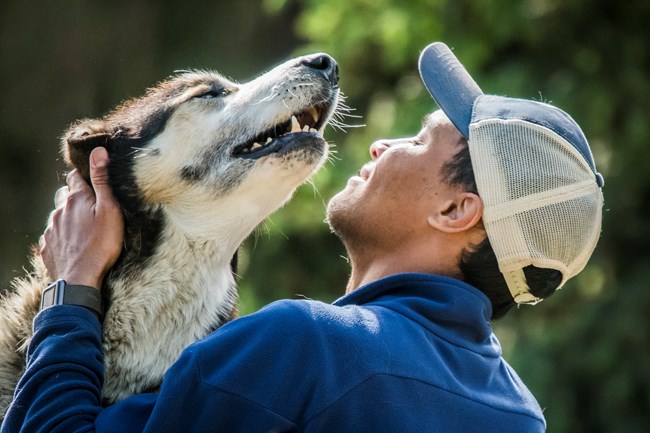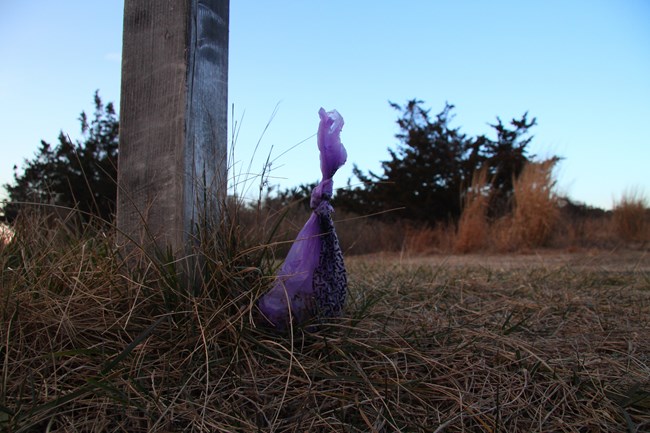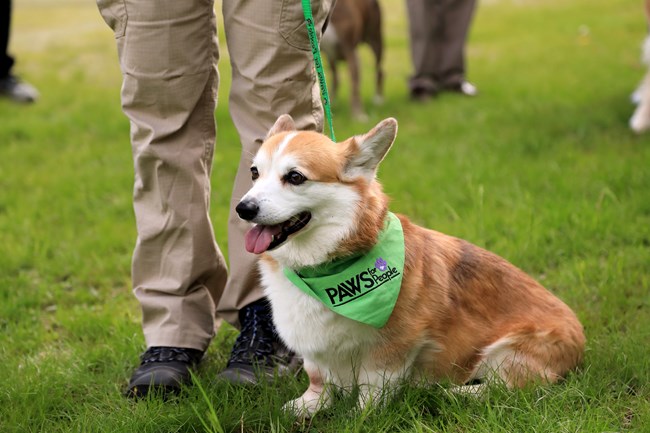Be a Conservation-Minded Pet Parent
Our “fur-babies” are important members of our families, but they can also take a toll on our local environments. If the proper precautions are not taken, they can harm wildlife, introduce harmful bacteria and parasites into our waterways, and contribute to climate change. Being a conservation-minded pet parent not only helps reduce your pet’s impact on the environment, but it can help keep your pets safer and happier!
Here are some ways you can help:

NPS
Keep your pets under your control.
Domesticated pets are not part of your natural ecosystem and interactions with wildlife can be harmful to wildlife and your pet. It’s estimated that cats in the United States kill around 2.4 billion birds every year. Help protect birds and other wildlife by keeping your cat indoors, an enclosed “catio,” or on a leash. Dogs can also impact wildlife. Keeping dogs in a fenced area or leashed when outdoors helps protect wildlife and it keeps your dog safer too!
Choose sustainable pet products.
Do your homework to find companies that use earth friendly ingredients and production practices. This will benefit not only the environment, but your pet as well!

NPS
Pick up pet waste outside.
If your dog is a B.A.R.K. Ranger, you know that picking up your dog’s poop is essential for the health of our parks. The same goes for your local community! Pet waste can introduce harmful bacteria into fresh water sources or pass diseases onto wildlife. Help protect clean water and wildlife by always picking up your pet’s waste.
Properly dispose of pet waste.
Disposing of pet waste in an eco-friendly way can be a little tricky, but here are some tips to help you do what’s best for your local ecosystem.
-
Never flush cat waste. It can clog your plumbing and most sewage treatment systems are not equipped to treat the parasites found in cat waste.
- Use biodegradable pet waste bags to reduce the amount of plastic entering landfills.

Adopt, don't shop.
6 to 8 million dogs and cats enter shelters each year in the United States and 2.7 million of those animals are euthanized each year. Help reduce overpopulation by choosing to adopt your new furry family member rather than shopping for one.
Don’t keep threatened or endangered animals as pets.
Not only is it illegal to keep a threatened or endangered animal as a pet, but it also puts these animals at risk for increased poaching and capture. Learn more about what you can do to protect threatened and endangered species.

Pets are for life.
Don’t dump aquariums into waterways or release your pet into the wild. It’s definitely not in your pet’s best interest and chances are that your pet does not naturally belong in your local ecosystem and can negatively affect native wildlife and habitats. Learn more about stopping the spread of invasive species where you are.
Help pets be more comfortable when they’re away from home.
Training and socialization go a long way to help pets (and their pet parents!) experience less stress when away from home or visiting a national park. And it all starts at home! Set your pet up for success for any adventure away from home. Preparation also helps you be aware of your surrounding and impact on the environment.
Connected Conservation
Conservation at HomeLast updated: June 5, 2023
